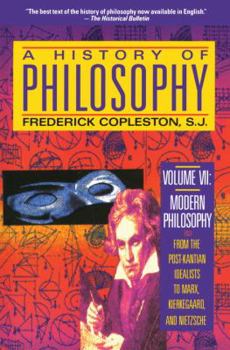A History of Philosophy, Vol. 7: Modern Philosophy - From the Post-Kantian Idealists to Marx, Kierkegaard, and Nietzsche
(Book #7 in the A History of Philosophy Series)
Select Format
Select Condition 
Book Overview
Conceived originally as a serious presentation of the development of philosophy for Catholic seminary students, Frederick Copleston's nine-volume A History Of Philosophy has journeyed far beyond the modest purpose of its author to universal acclaim as the best history of philosophy in English. Copleston, an Oxford Jesuit of immense erudition who once tangled with A. J. Ayer in a fabled debate about the existence of God and the possibility of metaphysics,...
Format:Paperback
Language:English
ISBN:0385470444
ISBN13:9780385470445
Release Date:February 1994
Publisher:Image
Length:512 Pages
Weight:1.15 lbs.
Dimensions:8.1" x 1.1" x 5.4"
Customer Reviews
5 ratings
Review of Copleston's History, Volume Seven
Published by Thriftbooks.com User , 15 years ago
My Credentials: I'm merely a student of philosophy for the time being, not a teacher, so I'm no scholar. I have, however, read Copleston through the seventh volume, so I'm certainly a veteran of his History; I know its strengths and weaknesses. Review: The volume does a wonderful job of delineating the complex systems of metaphysical idealism, which I was somewhat intimated to approach. Copleston is esoterically extensive in his consideration of Fitche, Schelling and Hegel. Schopenhauer and Kierkegaard are well-treated. The volume is also strong in its covering of minor thinkers (as are ALL Copleston volumes). The volume is utterly pathetic in its examination of the twentieth-century German titans: Husserl and Hiedegger. I would also argue that it is weak in its examination of Nietzsche, but I may be over estimating this philosopher's position in history.
Good overview of mostly terrible philosophers
Published by Thriftbooks.com User , 16 years ago
After Kant left wreckage of classical philosophy, but leaving fundamental flaws in his own Copernican Revolution, it seems the people after him took to such lengths as to add to his errors, hence the dawning of the idealists. They were obsessed with the idea of subject and object. The idealists thought that there was an infinite will. They started with Philosophy of the first science, stating fundamental truths. Why are they fundamental truths? Because they said so. Hence was the problem. They threw around infinite will, absolute ego, absolute consciousness, ad nauseum until it made you wonder whether they had any idea what they were talking about. The main problem is that they essentially thought the individual is the way the absolute ego becomes conscious of himself, so in essence we're all the same unified blob that simply thinks we're completely separate entities. They keep talking about self-realization and other warm fuzzies that just struck this reader as silly sophistry. In all honesty, Fichte and Schelling had some good things to say, though their underlying mentality was flawed. Hegel was nauseating, and the worst case of mental masturbation this reader has ever encountered. Copleston defended Hegel a few times, essentially saying "It isn't completely empty-headed blather, hear him out a little." No, it really was that dumb. After their silly ponderings the cynical but down to earth writing of Schopenhauer was welcomed. It's really a shame such little space was devoted to Kierkegaard, who had more poignant things to say than all the idealists combined. Nietzsche gets more attention, but his musings are less philosophical investigations as vicious ranting. A shame Copleston chose to focus so much on such lightweights, but this reader might have missed something too.
Interesting
Published by Thriftbooks.com User , 16 years ago
After the modern philosophers shed Aristotlianism and Platonism at least to a large extent, things got a lot more interesting when they started espousing their theories. The first principles of their arguments became more divierse, and many times lead to some very different metaphysics. How much you enjoy a philosopher probably says a lot about what your own mentality is. I personally liked Descartes, that, though still more or less a dualist, he came from the existential principles of experience. Some of his thought was flawed, like being able to espouse metaphysics without sufficient empirical study to back it up, but he most certainly was on the right track. Spinoza, on the other hand, I could not stand. He just replaces Nature with the word God and hopes nobody notices he's not saying anything at all. I hate people who deny any sort of freedom then espouse how one can live a virtuous life. Hey Spinoza, it's all either matter in motion or it's not. Liebniz was downright headache inducing at points, and his theory of monads was wonderfully goofy. That being said, his theory of knowledge was excellent. Can't say I ever thought of the universe the way he did. As always, Copleston is even handed, probably too even handed for some of the sillier things they said. Then again, as a layperson with no formal training, maybe I missed something too that he saw. Still, I'd prefer Copleston's fairness to the in your face bashing of Russell anyday.
Comprehensive and enlightening
Published by Thriftbooks.com User , 22 years ago
I read the whole series nine volumes twice. Being a business major in school I didnot have any true understanding of philosophy, but this book really got me interested and I started reading on philosophy. I definitely recommand it for anyone interested in serious reading.
Great
Published by Thriftbooks.com User , 25 years ago
This series is great. I have been reading the series over the past 3 years at irregular intervals. I am over halfway finished. It has been one of the most rewarding things I've ever done.






